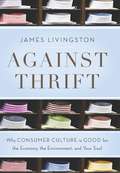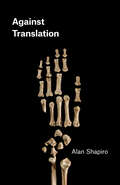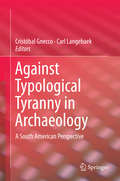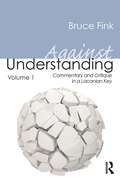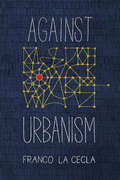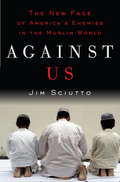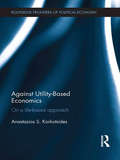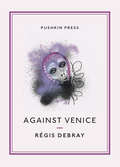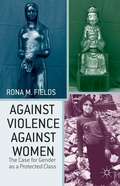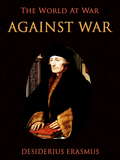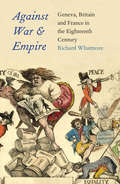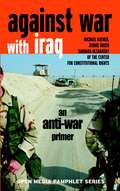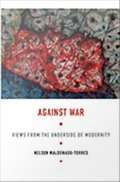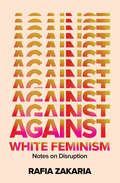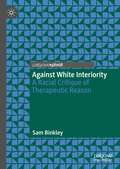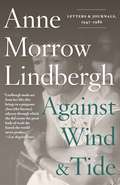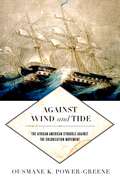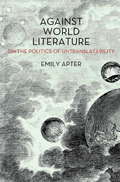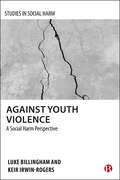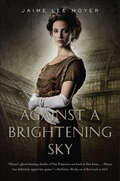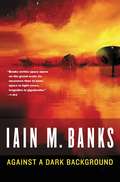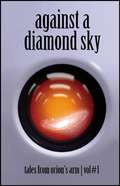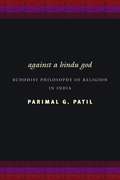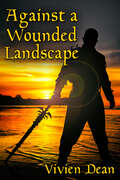- Table View
- List View
Against Thrift
by James LivingstonSince the financial meltdown of 2008, economists, journalists, and politicians have uniformly insisted that to restore the American Dream and renew economic growth, we need to save more and spend less. In his provocative new book, historian James Livingston--author of the classic Origins of the Federal Reserve System--breaks from the consensus to argue that underconsumption caused the current crisis and will prolong it. By viewing the Great Recession through the prism of the Great Depression, Livingston proves that private investment is not the engine of growth we assume it to be. Tax cuts for business are therefore a recipe for disaster. If our goal is to reproduce the economic growth of the postwar era, we need a redistribution of income that reduces corporate profits, raises wages, and promotes consumer spending.
Against Translation (Phoenix Poets)
by Alan ShapiroWe often ask ourselves what gets lost in translation—not just between languages, but in the everyday trade-offs between what we experience and what we are able to say about it. But the visionary poems of this collection invite us to consider: what is loss, in translation? Writing at the limits of language—where “the signs loosen, fray, and drift”—Alan Shapiro probes the startling complexity of how we confront absence and the ephemeral, the heartbreak of what once wasn’t yet and now is no longer, of what (like racial prejudice and historical atrocity) is omnipresent and elusive. Through poems that are fine-grained and often quiet, Shapiro tells of subtle bereavements: a young boy is shamed for the first time for looking “girly”; an ailing old man struggles to visit his wife in a nursing home; or a woman dying of cancer watches her friends enjoy themselves in her absence. Throughout, this collection traverses rather than condemns the imperfect language of loss—moving against the current in the direction of the utterly ineffable.
Against Typological Tyranny in Archaeology: A South American Perspective
by Cristóbal Gnecco Carl LangebaekThe papers in this book question the tyranny of typological thinking in archaeology through case studies from various South American countries (Venezuela, Colombia, Bolivia, Argentina, and Brazil) and Antarctica. They aim to show that typologies are unavoidable (they are, after all, the way to create networks that give meanings to symbols) but that their tyranny can be overcome if they are used from a critical, heuristic and non-prescriptive stance: critical because the complacent attitude towards their tyranny is replaced by a militant stance against it; heuristic because they are used as means to reach alternative and suggestive interpretations but not as ultimate and definite destinies; and non-prescriptive because instead of using them as threads to follow they are rather used as constitutive parts of more complex and connective fabrics. The papers included in the book are diverse in temporal and locational terms. They cover from so called Formative societies in lowland Venezuela to Inca-related ones in Bolivia; from the coastal shell middens of Brazil to the megalithic sculptors of SW Colombia. Yet, the papers are related. They have in common their shared rejection of established, naturalized typologies that constrain the way archaeologists see, forcing their interpretations into well known and predictable conclusions. Their imaginative interpretative proposals flee from the secure comfort of venerable typologies, many suspicious because of their association with colonial political narratives. Instead, the authors propose novel ways of dealing with archaeological data.
Against Understanding, Volume 1: Commentary and Critique in a Lacanian Key
by Bruce Fink2014 American Board & Academy of Psychoanalysis Book Prize winner for Best Anthology Against Understanding, Volume 1, explores how the process of understanding (which can be seen to be part and parcel of the Lacanian dimension of the imaginary) reduces the unfamiliar to the familiar, transforms the radically other into the same, and renders practitioners deaf to what is actually being said in the analytic setting. Running counter to the received view in virtually all of contemporary psychotherapy and psychoanalysis, Bruce Fink argues that the current obsession with understanding – on the patient’s part as well as on the clinician’s – is excessive insofar as the most essential aim of psychoanalytic treatment is change. Using numerous case studies and clinical vignettes, Fink illustrates that the ability of clinicians to detect the unconscious through slips of the tongue, slurred speech, mixed metaphors, and other instances of "misspeaking" is compromised by an emphasis on understanding the why and wherefore of patients’ symptoms and behavior patterns. He shows that the dogged search for conscious knowledge about those symptoms and patterns, by patients and practitioners alike, often thwart rather than foster change, which requires ongoing access to the unconscious and extensive work with it. In this first part of a two-volume collection of papers, many of which have never before appeared in print, Bruce Fink provides ample evidence of the curative powers of speech that operate without the need for any sort of explicit, articulated knowledge. Against Understanding, Volume 1 brings Lacanian theory alive in a way that is unique, demonstrating the therapeutic force of a technique that relies far more on the virtues of speech in the analytic setting than on a conscious realization about anything whatsoever on patients’ parts. This volume will be of interest to psychoanalysts, psychotherapists, psychiatrists, psychologists, social workers, and counselors.
Against Understanding, Volume 2: Cases and Commentary in a Lacanian Key
by Bruce FinkAgainst Understanding, Volume 2, casts a spotlight on the status of case studies in psychoanalysis, which are commonly used to illustrate clinicians’ expertise and mastery rather than patients’ actual itineraries. When a case is presented, the complex, unwieldy, and often self-contradictory material of a therapeutic trajectory is often vastly oversimplified in view of producing a linear narrative that seems perfectly to fit the parameters of a practitioner’s preferred theoretical framework. Bruce Fink attempts to eschew the appearance of "mastery" in assembling clinical material and in discussing his approach to practice and theory in the myriad case histories and vignettes included in both Volumes 1 & 2 of Against Understanding. To counterbalance the kind of paring down of material usually carried out to make cases conform to a particular paradigm, the case write-ups presented here include much of the "raw data" so often omitted: verbatim quotes from patients about their lives, backgrounds, dreams, and fantasies; and details about the many obscure, vacillating, and unruly phases of treatment. Fink hopes thereby to allow readers to form their own opinions about the well-foundedness or unsoundness of his formulations, interpretations, and interventions. This second part of a two-volume collection of papers, interviews, and case studies provides the reader with hundreds of illustrations of Lacanian theory in practice, and will be essential for psychoanalysts, psychotherapists, psychiatrists, psychologists, social workers and counselors.
Against Urbanism (Green Arcade)
by Franco La CeclaAfter demolishing the myth of the rock star architect with his book Against Architecture, Franco La Cecla now explores the decisive challenges that cities are going to have to confront in the near future. Urban planning and development has become increasingly inadequate in response to the daily realities of life in our cities. Human, economic, ethnic, and environmental factors are systematically overlooked in city planning and housing development, and anachronistic, sterile, and formalistic architecture almost invariably prevails. Never more than today has democracy played itself out in public spaces, sidewalks, and streets. Urban planners and developers, however, are still prisoners of an obsolete vision of passivity which betrays actual city needs and demands. A new urban science is required which can, first of all, guarantee a civil, dignified life for all—urban development which ensures the right to a humane mode of daily living, which has been and still is completely ignored.
Against Us: The New Face of America's Enemies in the Muslim World
by Jim Sciutto"A solid job of reporting, a personal journey of discovery, and a wake-up call for all who read it. " --Charles Gibson, ABC News. After nearly one hundred assignments for ABC News in Muslim countries, Jim Sciutto brings back this disturbing truth: the Al-Qaeda-inspired view of an evil America bent on destroying Islam has moved from the fringes to the mainstream. Sciutto profiles a cross-section of people in the Arab world, including a former Al-Qaeda jihadi turned electrician in Saudi Arabia, a Jordanian college student willing to risk his life by killing Americans in Baghdad, a Christian woman who supports Hezbollah in Lebanon, bitter pro-democracy advocates in Egypt who feel betrayed by the United States, and British-born Muslim terrorists living in London. The result is an alarming portrait of the depth and scope of anti-American sentiment. Yet there is hope for America to turn the tide of hate. Democratic ideals are still held in high esteem, even as America's perceived actions against Muslims are not, and President Obama's election has raised hopes for change among many Muslims. Against Us is an urgent wake-up call for all Americans--and in particular those charged with formulating U. S. foreign policy--to rebuild relations with the Arab world and restore confidence in American values.
Against Utility-Based Economics: On a Life-Based Approach (Routledge Frontiers of Political Economy)
by Anastasios S. KorkotsidesUtility-based theory and the fallback choice-theoretic framework are shown to be biased, irremediably flawed and misleading. A radically different theory of value and of consumer behaviour is proposed based on existential interpretations of scarcity, value and self-interest. For self-conscious mortals, only time is scarce. All other is derivative scarcity. Value is in the life, as a knowledge extract of time, which goes into commodities as direct human labour and depreciated capital, through their production. By structuring their preferences, consumers try to confiscate more of such value per unit of expended income, extending their social presence, soothing their angst and gaining power over each other. This raises output and makes gains cancel out. Negative psychological externalities preclude any well-being or social-welfare type conclusion. These resolve a number of long-standing issues: endogenously generated growth, the micro-macro connection, the price mechanism, crises, unemployment, etc. Equilibrium is of a low-potential kind, not of a force-balancing one, and it is unique, reachable and stable. The relevant analytics involve purely economic, non-psychological entities. Consumer behaviour is grounded on a well-defined, structure-based decision criterion and on observably measurable magnitudes, only. The social ramifications of the two juxtaposed perspectives are discussed at length.
Against Venice
by John Howe Regis DebrayNumerous writers have made declarations of love to cities, but Against Venice speaks not of love, but of dislike. It is a counterblast to intellectuals who regard Venice as the city where existentialism should be experienced, at parties in the palazzi of friends. Debray criticises this world in a refreshingly irreverent way, luring the traveller back to this seductive city.
Against Violence against Women
by Rona M. FieldsResponding to the targeted destruction of women, Fields argues for establishing Gender as a protected class under the Genocide Convention. Cases are explored, historically, anthropologically, psychologically and sociologically, from the author's field research, as well as focuses on morbidity, mortality and demographic documentation data.
Against War (The World At War)
by Desiderius ErasmusA classic anti-war essay from the mid-1500s. Erasmus gives elegant arguments against war from both religious (Christian) and logical (economic, practical) points of view. He seems particularly alarmed and confused by Christians fighting wars with Christians. The problem, of course, is that people waging war only consider religious or logical reasons when they are looking for excuses to wage war.
Against War and Empire
by Richard WhatmoreAs Britain and France became more powerful during the eighteenth century, small states such as Geneva could no longer stand militarily against these commercial monarchies. Furthermore, many Genevans felt that they were being drawn into a corrupt commercial world dominated by amoral aristocrats dedicated to the unprincipled pursuit of wealth. In this book Richard Whatmore presents an intellectual history of republicans who strove to ensure Geneva’s survival as an independent state. Whatmore shows how the Genevan republicans grappled with the ideas of Rousseau, Voltaire, Bentham, and others in seeking to make modern Europe safe for small states, by vanquishing the threats presented by war and by empire.
Against War with Iraq: An Anti-war Primer (Open Media Series)
by Barbara Olshansky Michael Ratner Jennie GreenDespite public outcry at home and international opposition abroad, the Bush Administration deployed troops and invested millions in preparation for a massive military assault on Iraq. In this Open Media Series special edition, three legal scholars from the Center for Constitutional Rights argue persuasively that the looming war against Iraq is both unnecessary for national security, and illegal. Against War with Iraq describes the high cost of the US war in Iraq in terms of human life, as well as the economic and political havoc it will trigger. A timely and much needed anti-war primer, Against War with Iraq contains the core facts and analysis needed to understand the issues and become an effective advocate against hawkish U.S. foreign policy.
Against War: Views from the Underside of Modernity
by Nelson Maldonado-TorresNelson Maldonado-Torres argues that European modernity has become inextricable from the experience of the warrior and conqueror. In Against War, he develops a powerful critique of modernity, and he offers a critical response combining ethics, political theory, and ideas rooted in Christian and Jewish thought. Maldonado-Torres focuses on the perspectives of those who inhabit the underside of western modernity, particularly Jewish, black, and Latin American theorists. He analyzes the works of the Jewish Lithuanian-French philosopher and religious thinker Emmanuel Levinas, the Martiniquean psychiatrist and political thinker Frantz Fanon, and the Catholic Argentinean-Mexican philosopher, historian, and theologian Enrique Dussel. Considering Levinas's critique of French liberalism and Nazi racial politics, and the links between them, Maldonado-Torres identifies a "master morality" of dominion and control at the heart of western modernity. This master morality constitutes the center of a warring paradigm that inspires and legitimizes racial policies, imperial projects, and wars of invasion. Maldonado-Torres refines the description of modernity's war paradigm and the Levinasian critique through Fanon's phenomenology of the colonized and racial self and the politics of decolonization, which he reinterprets in light of the Levinasian conception of ethics. Drawing on Dussel's genealogy of the modern imperial and warring self, Maldonado-Torres theorizes race as the naturalization of war's death ethic. He offers decolonial ethics and politics as an antidote to modernity's master morality and the paradigm of war. Against War advances the de-colonial turn, showing how theory and ethics cannot be conceived without politics, and how they all need to be oriented by the imperative of decolonization in the modern/colonial and postmodern world.
Against White Feminism: Notes On Disruption
by Rafia ZakariaA radically inclusive, intersectional, and transnational approach to the fight for women’s rights. <p><p> Upper-middle-class white women have long been heralded as “experts” on feminism. They have presided over multinational feminist organizations and written much of what we consider the feminist canon, espousing sexual liberation and satisfaction, LGBTQ inclusion, and racial solidarity, all while branding the language of the movement itself in whiteness and speaking over Black and Brown women in an effort to uphold privilege and perceived cultural superiority. An American Muslim woman, attorney, and political philosopher, Rafia Zakaria champions a reconstruction of feminism in Against White Feminism, centering women of color in this transformative overview and counter-manifesto to white feminism’s global, long-standing affinity with colonial, patriarchal, and white supremacist ideals. <p><p> Covering such ground as the legacy of the British feminist imperialist savior complex and “the colonial thesis that all reform comes from the West” to the condescension of the white feminist–led “aid industrial complex” and the conflation of sexual liberation as the “sum total of empowerment,” Zakaria follows in the tradition of intersectional feminist forebears Kimberlé Crenshaw, Adrienne Rich, and Audre Lorde. Zakaria ultimately refutes and reimagines the apolitical aspirations of white feminist empowerment in this staggering, radical critique, with Black and Brown feminist thought at the forefront.
Against White Interiority: A Racial Critique of Therapeutic Reason
by Sam BinkleyThis book presents a bold critique of the new racial sensibility that has attained global prominence following the police murder of George Floyd. Through a set of managerial and therapeutic discourses, this new sensibility describes the inner racial life of white subjects, inducing them to adopt a therapeutic attitude toward deeply interiorized white emotions and conflicts. In so doing, the new racial sensibility promises to remake whiteness in the image of the self-aware racial ally. However, such an appeal, it is argued, serves the subtle function of the preservation of white racial dispositions, and the reproduction of the very racism it sets out to transform. Adopting a critical lens derived from Michel Foucault’s analysis of sexuality, together with an engagement with sociological, psychoanalytic and phenomenological reflections on shame as a racial affect, a critique of white interiority considers alternative frames through which white anti-racist subjection might be imagined.
Against Wind and Tide: Letters and Journals, 1947-1986
by Reeve Lindbergh Anne Morrow LindberghWhy, as an eager and talented writer, has Anne Morrow Lindbergh published so relatively little in forty years of marriage?" asked reviewer John Barkham in 1970. "After a promising start with those first books on flying, she tapered off into long silences broken by an infrequent volume of verse or prose." Many years later, Lindbergh replied with a quote from Harriet Beecher Stowe, who claimed that writing, for a wife and mother, is "rowing against wind and tide." In this sixth and final collection of Lindbergh's diaries and letters, taking us from 1947 to 1986, we mark her progress as she navigated a remarkable life and a remarkable century with enthusiasm and delight, humor and wit, sorrow and bewilderment, but above all devoted to finding the essential truth in life's experiences through a hard-won spirituality and a passion for literature. Between the inevitable squalls of life with her beloved but elusive husband, the aviator Charles A. Lindbergh, she shepherded their five children through whooping cough, horned toads, fiancés, the Vietnam War, and their own personal tragedies. She researched and wrote many books and articles on issues ranging from the condition of Europe after World War II to the meaning of marriage to the launch of Apollo 8. She published one of the most beloved books of inspiration of all time, Gift from the Sea. She left penetrating accounts of meetings with such luminaries as John and Jacqueline Kennedy, Thornton Wilder, Enrico Fermi, Leland and Slim Hayward, and the Frank Lloyd Wrights. And she found time to compose extraordinarily insightful and moving letters of consolation to friends and to others whose losses touched her deeply. More than any previous books by or about Anne Morrow Lindbergh, Against Wind and Tide makes us privy to the demons that plagued this fairy-tale bride, and introduces us to some of the people--men as well as women--who provided solace as she braved the tides of time and aging, war and politics, birth and death. Here is an eloquent and often startling collection of writings from one of the most admired women of our time.
Against Wind and Tide: The African American Struggle against the Colonization Movement (Early American Places #10)
by Ousmane K. Power-GreeneAgainst Wind and Tide tells the story of African American’s battle against the American Colonization Society (ACS), founded in 1816 with the intention to return free blacks to its colony Liberia. Although ACS members considered free black colonization in Africa a benevolent enterprise, most black leaders rejected the ACS, fearing that the organization sought forced removal. As Ousmane K. Power-Greene’s story shows, these African American anticolonizationists did not believe Liberia would ever be a true “black American homeland.”In this study of anticolonization agitation, Power-Greene draws on newspapers, meeting minutes, and letters to explore the concerted effort on the part of nineteenth century black activists, community leaders, and spokespersons to challenge the American Colonization Society’s attempt to make colonization of free blacks federal policy. The ACS insisted the plan embodied empowerment. The United States, they argued, would never accept free blacks as citizens, and the only solution to the status of free blacks was to create an autonomous nation that would fundamentally reject racism at its core. But the activists and reformers on the opposite side believed that the colonization movement was itself deeply racist and in fact one of the greatest obstacles for African Americans to gain citizenship in the United States.Power-Greene synthesizes debates about colonization and emigration, situating this complex and enduring issue into an ever broader conversation about nation building and identity formation in the Atlantic world.
Against World Literature
by Emily ApterAgainst World Literature: On the Politics of Untranslatability argues for a rethinking of comparative literature focusing on the problems that emerge when large-scale paradigms of literary studies ignore the politics of the "Untranslatable"--the realm of those words that are continually retranslated, mistranslated, transferred from language to language, or especially resistant to substitution.In the place of "World Literature"--a dominant paradigm in the humanities, one grounded in market-driven notions of readability and universal appeal--Apter proposes a plurality of "world literatures" oriented around philosophical concepts and geopolitical pressure points. The history and theory of the language that constructs World Literature is critically examined with a special focus on Weltliteratur, literary world systems, narrative ecosystems, language borders and checkpoints, theologies of translation, and planetary devolution in a book set to revolutionize the discipline of comparative literature.
Against Youth Violence: A Social Harm Perspective (Studies in Social Harm)
by Luke Billingham Keir Irwin-RogersAvailable open access digitally under a CC-BY-NC-ND licence. For many children and young people, Britain is a harmful society in which to grow up. This book contextualizes the violence that occurs between a small number of young people within a wider perspective on social harm. Aimed at academics, youth workers and policy makers, the book presents a new way to make sense of this pressing social problem. The authors also propose measures to substantially improve the lives of Britain’s young people in areas ranging from the early years to youth services and the criminal justice system.
Against a Brightening Sky (Delia Martin #3)
by Jaime Lee MoyerBy 1919 the Great War has ended, peace talks are under way in Paris, and the world has been forever changed. Delia Martin, apprentice practitioner of magical arts, and her husband, Police Captain Gabriel Ryan, face the greatest challenge of their lives when fragments from the war descend on San Francisco. As Delia prepares to meet friends at a St. Patrick's Day parade, the strange ghost of a European princess appears in her mirror. Her pleasant outing becomes a nightmare as the ghost reappears moments after a riot starts, warning her as a rooftop gunman begins shooting into the crowd. Delia rushes to get her friends to safety, and Gabe struggles to stop the killing-and to save himself. Delia and Gabe realize all the chaos and bloodshed had one purpose-to flush Alina from hiding, a young woman with no memory of anything but her name. As Delia works to discover how the princess ghost's secrets connect to this mysterious young woman, and Gabe tracks a ruthless killer around his city, they find all the answers hinge on two questions: Who is Alina...and why can't she remember?Against a Brightening Sky is the thrilling conclusion to Jaime Lee Moyer's glittering historical fantasy series.
Against a Dark Background
by Iain M. BanksSharrow was once the leader of a personality-attuned combat team in one of the sporadic little commercial wars in the civilization based around the planet Golter. Now she is hunted by the Huhsz, a religious cult which believes that she is the last obstacle before the faith's apotheosis, and her only hope of escape is to find the last of the apocalyptically powerful Lazy Guns before the Huhsz find her.Her journey through the exotic Golterian system is a destructive and savage odyssey into her past, and that of her family and of the system itself.
Against a Diamond Sky: Tales from Orion's Arm, Vol. 1
by Orion's Arm Universe Project[from the back cover] The future isn't here yet but don't worry, it will be. Welcome to Orion's Arm, a scenario set thousands of years in the future where civilization spans the stars. Godlike ascended intelligences rule vast interstellar empires, and lesser factions seek to carve out their own dominions through intrigue and conquest. And out beyond the edge of civilized space and the human friendly worlds, adventure awaits those prepared to risk all. Collected here for your consideration are five stories exploring the Orion's Arm universe, spanning years and light-years to examine a vast and diverse future from its beginnings in the dying Solar System to its continuing advance toward an uncertain destiny. www.orionsarm.com
Against a Hindu God: Buddhist Philosophy of Religion in India
by Parimal PatilPhilosophical arguments for and against the existence of God have been crucial to Euro-American and South Asian philosophers for over a millennium. Critical to the history of philosophy in India, were the centuries-long arguments between Buddhist and Hindu philosophers about the existence of a God-like being called Isvara and the religious epistemology used to support them. By focusing on the work of Ratnakirti, one of the last great Buddhist philosophers of India, and his arguments against his Hindu opponents, Parimal G. Patil illuminates South Asian intellectual practices and the nature of philosophy during the final phase of Buddhism in India. <P><P>Based at the famous university of Vikramasila, Ratnakirti brought the full range of Buddhist philosophical resources to bear on his critique of his Hindu opponents' cosmological/design argument. At stake in his critique was nothing less than the nature of inferential reasoning, the metaphysics of epistemology, and the relevance of philosophy to the practice of religion. In developing a proper comparative approach to the philosophy of religion, Patil transcends the disciplinary boundaries of religious studies, philosophy, and South Asian studies and applies the remarkable work of philosophers like Ratnakirti to contemporary issues in philosophy and religion.
Against a Wounded Landscape
by Vivien DeanSir Tanash, the greatest knight Tasora has ever known, has one quest -- to rescue his king’s only son. Fifteen years ago, Princy Liseny was kidnapped, and in the time since, Tasora has crumbled. By bringing the prince home, Tanash hopes to return the kingdom to its former glory.As captive in a rival land, Liseny has spent most of his life locked away from the world, brought out as the ultimate prize while his real home is slowly destroyed. Escape is a godsend. So is Tanash, but neither is as simple as Liseny hopes. He has to learn to adjust in more ways than one. Though Tanash refuses to act on their mutual attraction, he does agree to help Liseny seek out an alliance to take back to Tasora.What he doesn’t expect is to fall for the young prince along the way ...
